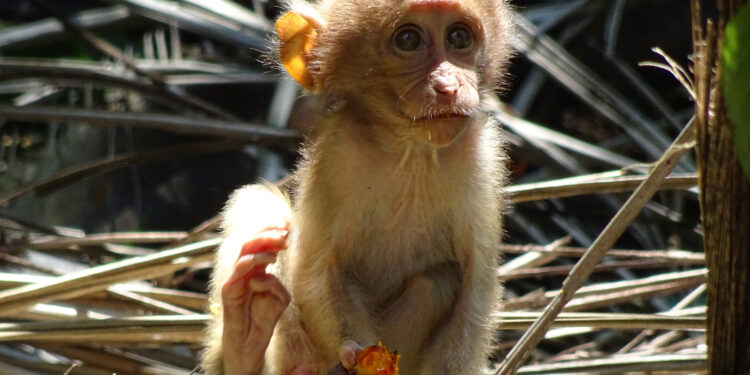Southern pig-tailed macaque feeding on an oil palm fruit. Credit: Anna Holzner
According to a new study published in Current biology. In addition to increased risk from predators and human encounters, exposure to harmful agricultural chemicals in this environment can harm infant development.
In wild populations, infant survival is crucial for determining individual fitness and for maintaining viable populations in changing environments. For primates, agricultural areas adjacent to tropical forest habitats can be a mixed blessing: while agricultural plantations may provide easy access to food, they also come with increased exposure to various hazards, which likely contributes to reduce infant survival in several species of wild primates.
Exposure to palm plantations increases child mortality
As part of a long-term collaboration between Universiti Sains Malaysia (USM), the German Center for Integrative Biodiversity Research (iDiv), the University of Leipzig (UL) and the Max Planck Institute for Anthropology Evolutionary (MPI EVA), researchers set out to study the potential links between frequent visits to oil palm plantations and the particularly high infant mortality observed in wild pig-tailed macaques in the south of the Malaysian peninsula.
In a study population habituated to this region, 57% of all infants born between 2014 and 2023 died before the age of one year, a rate that far exceeds mortality rates reported in other wild primate populations .
For nearly ten years, researchers followed two groups of macaques living in a mosaic of rainforest and palm oil plantations. They found that prolonged exposure to oil palm plantations during early childhood tripled the risk of infant mortality. This key finding could be explained by increased encounters with predators and humans and potential exposure to harmful chemicals such as pesticides in this environment.
“Some of these risks are relatively clear: baby macaques are more likely to fall prey to wild dogs that roam in packs on plantations or to be captured by humans and sold illegally as pets,” says Dr Nadine Ruppert of the USM, who established and directed the site. “But the potential long-term effects of pesticides used to manage monocultures on mammalian wildlife are much less clear and very poorly understood.”
Female pig-tailed macaque with baby. Credit: Anna Holzner
Pesticides can affect fetal development
The study also found an increase in infant mortality rates when mothers gave birth for the first time or when there was a long interval between two consecutive births, contradicting studies that report increased mortality when The interval between births is shorter.
The accumulation or assimilation of pesticides in the mother’s body could play a key role: “Literature suggests that certain harmful substances used in agriculture can cross the placental barrier and be transmitted to unborn offspring. It is also known that certain fat-soluble molecules can be transmitted through breast milk,” explains lead author Dr. Anna Holzner (iDiv, MPI EVA, UL and USM).
“As a result, the longer the chemicals accumulate in the mother’s body, the more they could influence the development of the fetus during pregnancy and also during breastfeeding.”
The study highlights the urgent need to address anthropogenic threats to animals in agricultural landscapes. “We know that the use of pesticides in agriculture has led to a drastic decline in insect populations. Chemical analysis is therefore essential to understand the effects of pesticides on mammalian fauna,” explains Professor Anja Widdig (UL, MPI EVA and iDiv). , lead author and principal investigator of this iDiv Flexpool project.
“Our results highlight the critical need to implement environmentally friendly agricultural practices that minimize risks to wildlife populations as well as people living near plantations.”
More information:
Anna Holzner et al, Agricultural habitat use affects infant survival in an endangered macaque species, Current biology (2024). DOI: 10.1016/j.cub.2023.12.002
Provided by the German Center for Integrative Biodiversity Research (iDiv) Halle-Jena-Leipzig
Quote: Plantations endanger primate infants, study finds (January 8, 2024) retrieved January 9, 2024 from
This document is subject to copyright. Apart from fair use for private study or research purposes, no part may be reproduced without written permission. The content is provided for information only.



